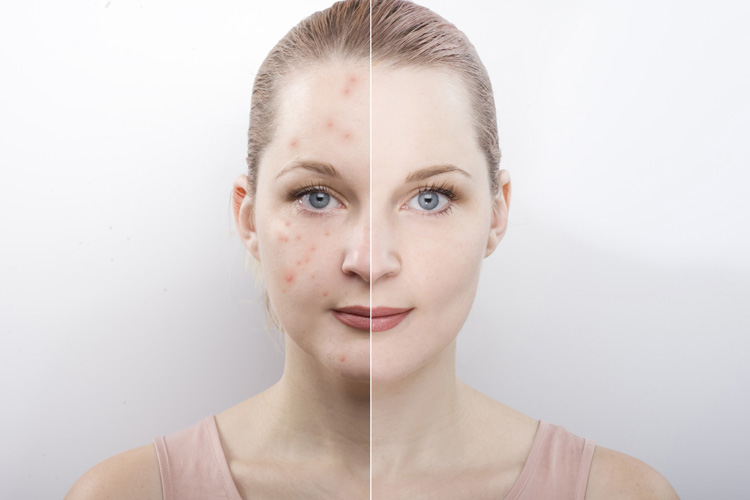
Acne! Don’t we just dread that word- a skin disease that we are well enough without, isnt it? And it is not just affecting teenagers these days, but even adults and post-menopausal women too, say medical science. Hormonal acne is what it is and sounds like.
What is Hormonal Acne?
It is acne that happens because of a hormonal fluctuation in the body. And this is typically associated with the fluctuation of hormones when puberty hits, and when adulthood hits too. Worse cases are always seen in women and there are many factors that contribute to the same- menses cycles to menopause to name a few.
Read on and learn more about hormonal acne, what causes it, the characteristics of the same and what diet plan and home remedies should be followed.
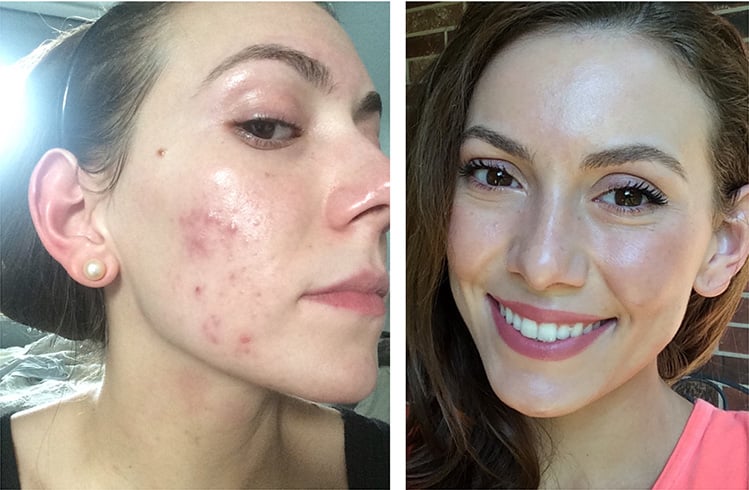
The primary causes of acne in adult women include-
- The production of excess oil and sebum, thanks to the hormones
- The shedding of skin cells that become sticky quite abnormally and gather around on the skin pores; clogging happens and the follicles are blocks- thanks to the hormones
- Propionbacterium acne or acne causing bacteria on the skin have grown in abundance could be another reason why hormonal acne happens in adult women.
- The role of androgen – blame it on the male hormones which are present in women too, and can contribute to the breakouts and eruptions on the skin.
Now that we have enlightened you with the causes of hormonal acne in adult women and in some teens too, let’s take a look at the characteristics of hormonal acne.
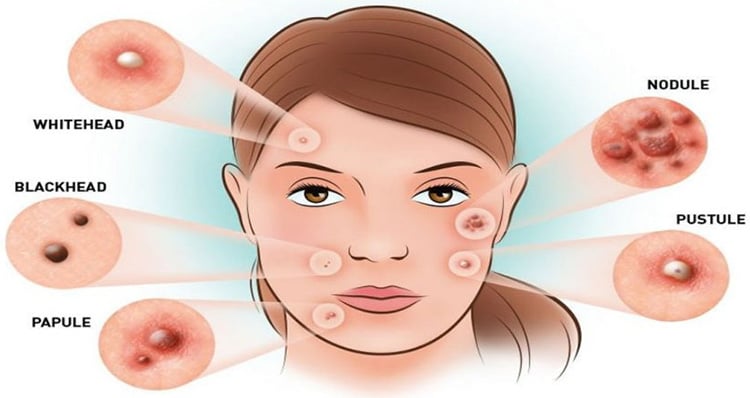
Characteristics of hormonal acne
Since we are talking about hormonal acne in particular, which is the imbalance of sex hormones in the body- estrogen and progesterone and the androgens and testorene, let’s take a look at the characteristics of the same, shall we?
1. There are other hormonal symptoms in the body that you suffer from-
If there is an underlying hormonal balance in the body, it would show up as hormonal acne. The most common underlying symptom for the imbalance would be PMS, which is accompanied by irritation, mood swings, anxiety and bloating, breasts turning sore and cravings too. PMS is not just a symptom, it is a sign telling you that your body needs more attention.. These are some of the signs that are associated when hormones are imbalanced, and hence acne from hormonal imbalance is not just a sole thing to deal with.
2. Check the areas around the mouth, the jaw and the chin
When you have hormonal acne, it would first and always appear around your chin, the mouth and the jawline at times. And when it progresses or gets worse, it would spread across the face and all over the body too. Why is it showing up elsewhere? This is because the hormones don’t sit just in one place when then run amok and cause imbalances and trouble!
3. Check your monthly cycles
One of the most typical characteristics of hormonal acne would be that it comes and goes with your monthly cycle. Medical science says that the most popular times for hormonal acne breakouts would be when the ovulation period is on and maybe just before the same.
4. Cystic acne
Not all cases of hormonal acne has to be cystic, however, nodules and cysts seem to be part and parcel of most cases. Cysts would be hard and big, and have fluid filled in the acne bumps which take a very long time to go. Sometimes, hormonal acne can also be small papules and pustules too, clogged pores as well and whiteheads too, or maybe a skin tone which is NOT EVEN!
5. Stubbornest of all acne types
Horomonal acne is that ill-mannered and stubborn as a mule child no mother wants. It is the most stubborn acne noticed ever on adult women, and they can be sitting right there for many days to come. Such acne would not respond to the best of treatments done for acne too. They might reduce a little if you change your diet and lifestyle ways, but do not expect the acne to leave you for good.
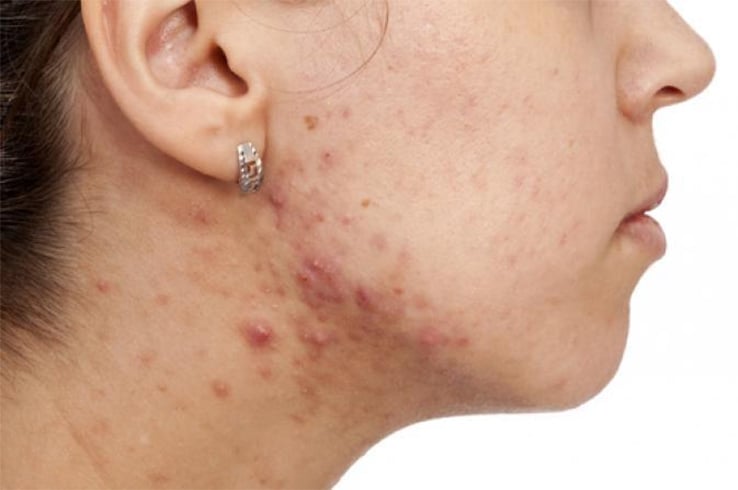
Is menopausal acne a form of hormonal acne?
As we age and reach menopause, women face night sweats and weight gain, and even hot flashes too. These are but signs of menopause. And then we have acne. If you thought acne was only for the teens to deal with, you were wrong. It can crop up again and greet you unwillingly when least expected in adulthood, say experts.
The American Academy of Dermatology opine “Whether you are 17 or 47, acne outbreaks have the same root cause: Changes in hormone levels affect the way your skin protects and regenerates itself, sometimes with unpleasant results. At the onset of menopause, or more accurately, the phase that leads into it, called perimenopause, levels of the female hormones, including estrogen, drop. But androgen levels, the male sex hormones that each woman has as well, remain constant. This situation in effect causes the body to experience a relative increase in the effect of these “male” hormones.”
Let’s also blame it on the rise of testosterone in the body- a strong form of male hormone present in most women, which acts like a trigger to the skin and results in hormonal and menopausal acne too.
- Using hormone therapy: HRT or hormone replacement would provide supplemental estrogen which helps with retention of skin elasticity and the softness of the same. HRT also can help the skin stay free from blemishes and acne. HRT in some cases can trigger the acne too, which is why doctors would not prescribe the same for dermatological reasons unless convinced.
- The use of topical treatments: Benzoyl peroxide being the most popular and common one to help reduce blemishes; antimicrobial gels and prescription antibiotic erythromycin (Benzamycin) help combat the issues of acne causing bacteria. There are vitamin A supplements and retinoids that help effectively too as topical medications to use.
- There are oral medications that can be taken to avoid and treat hormonal and adult acne as well. The dosage levels would be low- accutance is most used and prescribed.
- There are some self-care strategies too which need to be followed when dealing with adult acne and hormonal acne.
For example-
- Skin cleaning everyday
- Use of a gentle non-drying face cleanser
- Using a light moisturizer everyday
- Never to use harsh products
- No harsh exfoliation techniques should be done
- On mature and ageing skin, you have to be extra careful and gentle
- Pimples and acne should not be picked or squeezed
- Avoid tanning and sunbathing as much as possible
- Avoid the use of oil based cosmetics if you have an excess oily skin
- Use water based or mineral makeup as much as possible.
So now that you know about the characteristics and the signs or symptoms of adult and hormonal acne, let’s understand the ways to figure out if the acne is indeed hormonal or not! Please read on!
How do you know if your acne is hormonal?
The tell-tale signs are a few to check out for, and to know if it is indeed the hormones playing truant in acne formation and eruption on your skin.
Check with these three questions below- if you answered a YES to any of them, chances are it is hormonal. But do confirm the same with a specialist or a dermatologist.
- What is the frequency of the breakouts each month? Is it the same time each month?
- Are the breakouts happening in the same area on your face each month? Places to check are the cheeks, the chin and sometimes the jawline too. Check with a derma expert for face mapping on the same.
- Are the cysts and pimples deep? Do they pain you a lot?
With that, you now know the tell-tale signs better. Now let’s look into what causes major oil or excess oil production on the skin!
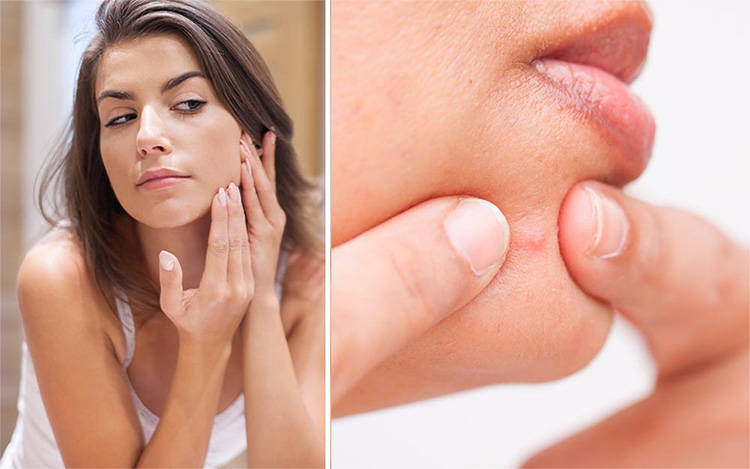
Major Causes of Excess Oil Production
It is a well-known fact that the body produces oil, which helps balance the acid mantle of the skin and to keep the skin soft, supple and moisturized at all times. However, excess of oil production or sebum productions means the sebaceous glands are over working. This can lead to acne flare ups.
Have you ever wonder why your face is so oily? Blame it on two factors- genetics and hormones.
- When puberty hits, the fluctuating hormones gives a rise to the levels of male hormones or androgens in the body. They cause oiliness in the hair and the skin. More the androgen present in the body, more sebum is funnelled and run through the pores, say skin specialists.
- Genetics too has a major role to play in the development of oil glands. In most patients that have super oily skin, it is seen that hormonal imbalance can be blamed on genes too. For example, pregnancy and puberty are life changing events that can alter the genes in the body and result in fluctuation of hormones too.
- There are other hormonal imbalances that can lead to super oil and sebum production. If a single hormone runs amok in the body, the whole system goes out of balance and can cause trouble. H
Here are a few causes of hormonal imbalance which you have to know that leads to hormonal acne too-
- Emotional issues and stress are to be blamed
- The use of synthetic environmental hormones found in plastic
- The use of contraceptive pills
- Physical stress at large
- The consumption of hormones from plant and animal based foods
- Lack of good diets
- Genetic disposition too
Some of the imbalances are-
- Adrenal stress and fatigue
- Elevated cortisol levels
- Hypothyroidism
- PCOS
- Dominance of estrogen
- Resistance to insulin to name a few.
Now that we have a fair idea on the major causes of super oily skin and excess oil production on the skin, let’s take a look at the natural remedies for relief of the same.
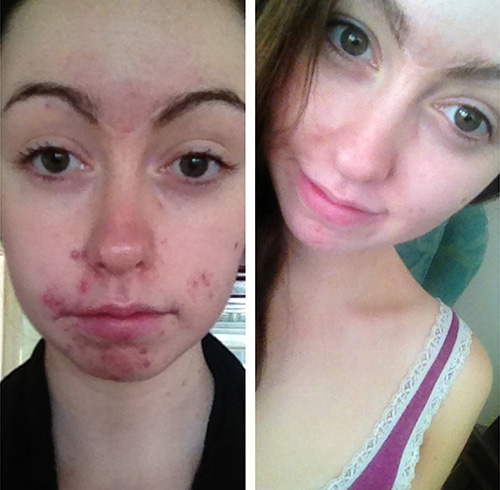
Natural Remedies for Hormonal Acne
1. Basil
What you need:
- A bunch of basil leaves
Directions:
- Crush the leaves in a mortar and pestle
- Make a paste of the same
- Apply it on the acne infected area
- Wait for ten minutes
- Wash off with cold water
- Pat dry very gently
How it works:
The use of basil leaves as a paste helps form an antimicrobial barrier on the skin and inhibits bacteria from multiplying. Doing this twice a day for a week will help kill the infection associated with acne and the oils present in basil leaves will calm and soothe the skin too.
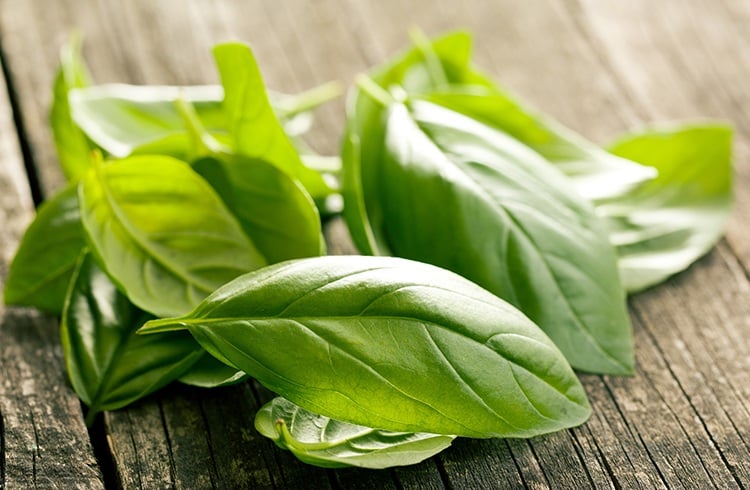
2. Ashwagandha
What you need:
- Some Ashwagandha
Directions:
- Powder ashwagandha
- Mix the powder with water to form a paste
- Apply it on the affected areas
- Wait for half an hour
- Wash off with cold water
- Pat dry gently
How it works:
This is to be done once everyday for five days. With ashwagandha applied topically, the skin is calmed and soothed, and the acne is reduced. The root can also be boiled in a cup of warm water with a dash of honey and drunk twice a day. It will help correct the hormonal imbalance and acts as an adaptogen which cares for the overall health.
When applied topically, it is an antimicrobial agent to defeat bacteria, and also an anti-inflammatory agent to heal wounds too.
3. Burdock Root
What all you need:
- The root of burdock
Directions:
- Powder the burdock root
- Make a tea of it by adding it to warm water or make a paste with the water
- Apply on the skin or consume the tea twice a day
- If applied topically, wash it off after ten minutes
- Pat dry gently
How it works:
Burdock Root is anti inflammatory and helps the skin calm down and soothe itself too. It also is an antioxidant that helps with the inhibition of free radicals and protects the skin from any form of attacks.
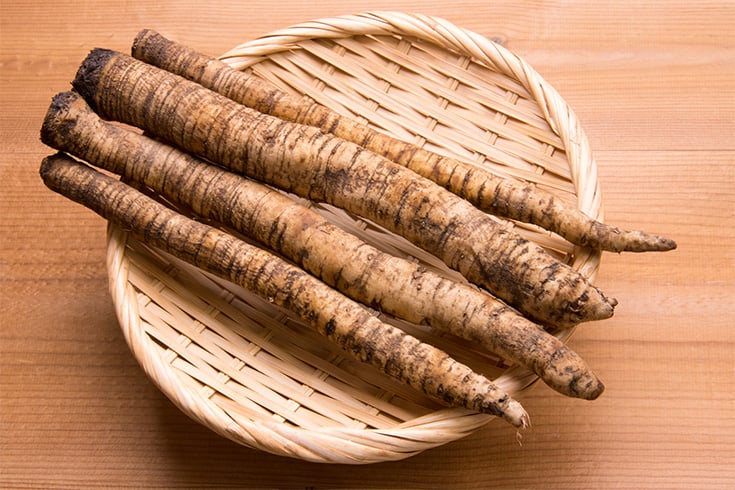
4. Green Tea
What all you need:
- A cup of green tea leaves
Directions:
- Brew the green tea and consume it as you would any normal tea, but with a dash of lime.
- Don’t throw away the leave residue; apply the residue on the acne infected areas
- Wait for ten minutes
- Wash off with cold water
- Pat dry gently
How it works:
Green tea is best used as an anti acne agent, an anti wrinkle and to combat free radicals. When you add a dash of lime to it, it helps with the production of collagen and also protects the skin from the harmful effects of bacteria too.
5. Tea Tree Oil
What all you need:
- A few drops of tea tree oil
- A night penetrating cream
Directions:
- Mix the two and apply only on the skin area where acne is seen
- Gently dab and wait for half an hour
- Wipe off with a wet cotton
- Gently dab and dry
How it works:
Tea tree oil is an emollient and an antimicrobial agent which when introduced to the acne would go deep into the pores and pull out the cyst. Use it only once a day.
Diet (Do’s and Don’ts)
There are many DIY ways and techniques to ensure that you balance the hormones and also take care of hormonal and adult acne, some of the few home remedies that we mentioned. However, along with that we have the dos and the donts to respect and follow. Here are the dos-
Have a dose of the following in you diets-
- You would need grapeseed oil which is an antioxidant
- Flaxseed oil which helps balance the pH levels of the skin
- GLA that comes from primrose to help balance the pH levels of the skin
- The use of OMEGA 3 is a must
- Sunflower seeds very good for oily skin control
- Extra virgin oil which helps balance the oil production
- Avocados for moisturizing and as an emollient so natural and nice
- Vitamin C for collagen production and as a nutrient to combat free radicals
- Zinc to protect, soothe and heal the skin
- Vitamin A to prevent dehydration
- Plenty of B vitamins, specifically vitamin B6
- The tea of licorice
- Have Ashwagandha
- Supplements with green tea extracts in it
- Nettle tea
- Cook with pumpkin seed oil
- Isoflavnoids from soya are good to have
- Saw plameto
- Spearmint tea to replenish the skin and refresh it too
- Bromelain from pineapple can help soften the skin as well.
Here are more tips
- Control the stress and reduce it.
- Your diet should be well-balanced.
- Have a lot of essential fatty acids,
We hope this information comes in handy.
Disclaimer: This information is done through research and should not be considered as the BIBLE of treating hormonal acne and adult acne. Your dermatologist would be the best to decide on your case and condition. His or her words would take precedence over what is written here and elsewhere online.
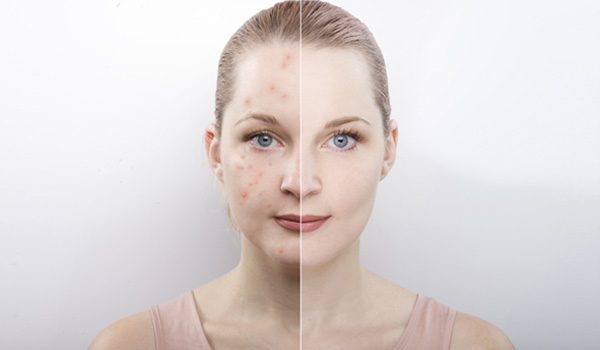
1 comment
What is the difference between hormonal acne and normal acne?